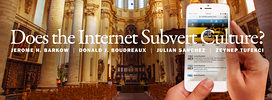Lead Essay
Jerome H. Barkow describes how cultures perpetuate and improve themselves - and how that process can dramatically break down. He suggests that the Internet is creating the conditions for a potentially disastrous social breakdown: When youth no longer respect and emulate high-status transmitters of culture, cultural knowledge is lost. And when that happens, cultures will dramatically change. With this change many adaptive behaviors may disappear, although we cannot say for sure just what will remain afterward. The dramatic substitution of sports stars and entertainers for local authority figures has been going on for quite some time, and its effects have only accelerated in the age of social media.
Response Essays
Donald J. Boudreaux accepts that social media have been transformative, but he doubts that “unsavory cultural consequences” are on the way. Living standards are the highest they have ever been, and they continue to rise. Material wealth has risen, he thinks, particularly because of rising knowledge - knowledge about the demand for certain products, knowledge about how the physical world works, knowledge about production and distribution techniques, and knowledge about local opportunities. Like other forms of media that have gone before them, social media have allowed us to trade and combine good ideas and bits of useful local knowledge that otherwise might never have been put to use. So while we can’t say for certain that we aren’t undermining the channels of cultural transmission, the future still looks brighter than ever, and fast, cheap communication itself is a big part of why it does.
Zeynep Tufekci argues that the Internet is replacing former modes of cultural transmission. But for many of us, it’s not replacing traditional local elders - it’s replacing the homogeneous, carefully produced mass media of the twentieth century. Now, rather than seeing only what the media industry wants us to see, we interact with celebrities in a much more personal, unmediated way. We also have many more of them - not just athletes, actors, and pop stars, but astrophysicists, philosophers, and the creators of YouTube videos can all serve as “celebrities” with fans of their own. On the personal level, although we now migrate more than ever, the Internet allows us to keep in touch with the cultures where we grew up. Social media’s role in cultural transmission is thus exceptionally complex, and it is not simply a matter of replacing static and traditional modes of cultural transmission with new and disruptive ones.
Julian Sanchez argues that the Internet has indeed wrought significant cultural change. But fears of online jihadism have been exaggerated; face-to-face recruitment remains a more potent method, it would appear, than Twitter. Apart from that, American teens nowadays seem remarkably well-behaved, and their online social activities mostly mirror their offline ones. And while some cultural knowledge has been lost, that in part has been the result of technological change rendering some careers obsolete while creating some new ones. It is ultimately unclear why we should be afraid of these new forms of cultural transmission, or the content that they convey.
Coming Up
Conversation through the end of the month.
Related at Cato
Cato Unbound: How Much Does Culture Matter? December 2006
Cato Unbound: Internet Liberation: Alive or Dead? January 2006

